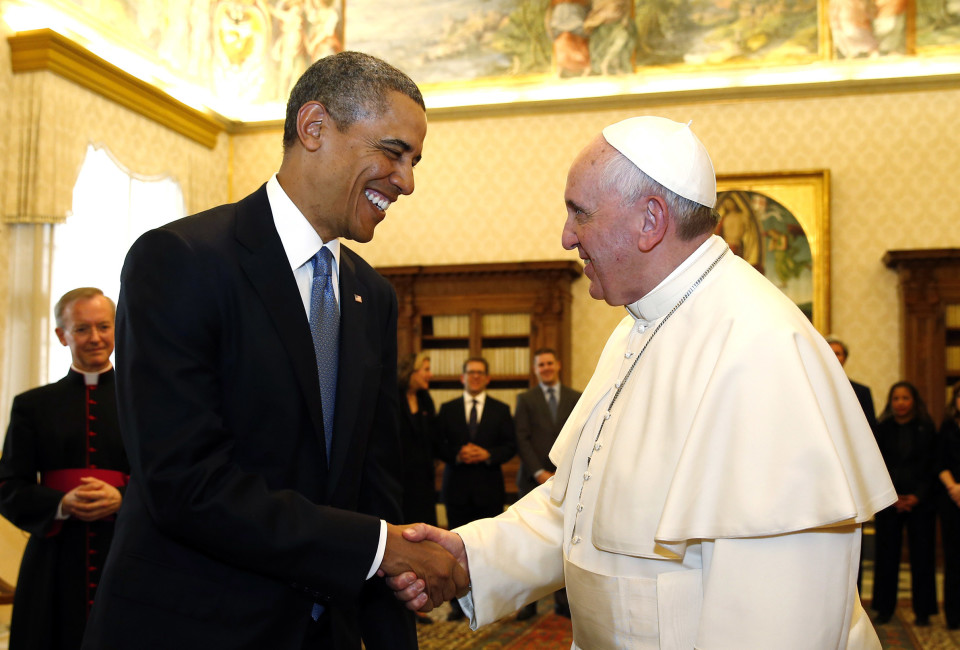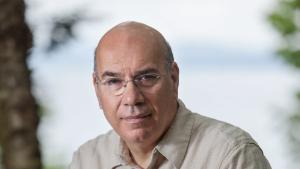
Why does Pope Francis stir respect, even love, in the hearts of millions, including non-Catholics? Like other Christians, I look to Francis for spiritual leadership. Here are 10 reasons why so many of us admire this pontiff, and why his examples set a moral challenge for us on many fronts.
1. Humility is a virtue
Francis embodies humility, having taken on the name of St. Francis of Assisi, a servant of the poor whose love of the natural world was legendary. A master of symbolism, Francis quickly dispensed with the fancy red slippers that popes wore. He moved into a small apartment in the Vatican and put the papal Mercedes in the garage, favoring a 20-year-old Renault with 190,000 miles on it.
Pope Francis’ gestures challenge us to live humbly and not be driven by ostentation. How many of us have tried to live with less in a smaller house, drive an older car or resole a pair of shoes?
2. Climate change is real
Pope Francis has put the church at the center of this subject, issuing a major encyclical on the environmental crisis that befalls us. In this hefty document, he urges all Christians to consider it their duty to become faithful stewards of their planet. He has seized on the issue of exploitation. “Isn’t nature humanity committing suicide with this indiscriminate and tyrannical use of nature?” He asked recently.
Here’s the challenge for you: Are you respecting the natural world and working against its despoiling? Have you managed to drive less, find alternative sources of energy or make a habit of recycling?
3. Commitment to the poor
Hardly a day passes without the Pope reminding his followers to care for those at the margins of society. He has toured impoverished countries, drawing attention to those in need. Boldly, he says the poor everywhere are being sacrificed at the “altar of money.”
Are we, many of whom call ourselves Christians, finding room in our hearts (and wallets) for those around us who lack shelter, food and clothing? Do we pay only lip service to the concept of charity?
4. Capitalism on trial
It’s no wonder that some have found this pope’s attitude toward the world economic order provocative.
He has widely denounced “a new colonialism” that creates policies with dire implications for the poor, and once quoted a fourth-century bishop who characterized the unbridled pursuit of money as “the dung of the devil.” He has argued that poor nations must not play the subservient role of providers of raw materials and cheap workers for wealthy countries.
Have we become too greedy for all our own good? With rising income inequality, are we mere helpless bystanders while we see the rich getting richer, the middle class getting poorer and the poor getting even poorer?
5. Gays in the church
One of this pope’s first shockers was a statement on gays in the church. “If someone is gay and he searches for the Lord and has good will, who am I to judge?” He famously asked. This statement marked a huge departure from the attitude of his predecessor in the Vatican, who called homosexuality “an intrinsic moral evil.”
“Judge not lest ye be judged yourself,” Jesus told us, and it’s a present challenge for most Christians almost every day.
Are you too quick to judge others? Are you opening your life to gay men and women, and treating them with respect and equality?
6. Women are equal
Francis hasn’t yet argued for allowing women into the priesthood, much to the dismay of many (including myself). But he has shown a willingness to listen, supporting “the work of deepening and of promoting” the role of women in the church.
It’s not easy when, like me, you were born into a patriarchal world, where it’s easy to take male privilege for granted. So we must try to be more aware, and to stand up for equal treatment of women in the workplace, to fight for pay parity and to take seriously the hard work of childrearing.
7. Reaching out to Islam
Francis reached out to Islam in striking fashion. On Holy Thursday in 2013, he bent to wash the feet of two Muslims, drawing international attention. And he has allied himself with the Palestinians several times, inviting President Mahmoud Abbas to the Vatican, where he called him “an angel of peace.”
Have we talked about Islam, or other religions, in ways that reflect badly on us and them? We are all God’s children, and there are no exceptions. Do we allow people to speak in anti-Muslim ways without correcting their misconceptions?
8. Accepting science as valid
Going back to Galileo, the church has frequently been at odds with science. But Francis has called for a reconciliation between science and theology, putting the weight of his office behind evolution as well as Big Bang theory. “God is not a magician with a magic wand,” he says. In this, he stands apart from his predecessor, Benedict XVI, who supported creationism and intelligent design. Francis argues that God “created human beings and let them develop according to the internal laws that he gave to each one so they would reach their fulfillment.”
To what degree have you tried to understand the tensions between science and religion, and to take the gift of reason seriously? When people deny climate change, do you attempt to tell them about the awful ramifications of no action?
9. A global vision
One of Pope Francis’ first gestures was to invite the Israelis and the Palestinians to the Vatican to “pray for peace.” And he was quick to put his moral force to use in helping to ease relations between the United States and Cuba. He has traveled widely, with open ears, listening to voices from every part of society.
Are we open to the broader world, its needs and sometimes urgent requests? Do we see that problems in the Middle East or China, for instance, affect us more than we realize?
10. Everybody’s pope
Pope Francis is asking us to live up to what Abraham Lincoln famously called “the better angels of our nature.” He is an agent of peace and reconciliation, of action and betterment. “He’s become the new Nelson Mandela, the new source of moral authority in the world,” says John Allen, an editor of Crux, a Catholic journal. “The papacy has not been this politically relevant since the end of the Cold War.”
This pope has put many urgent questions before us. Are you listening? Will you act?



